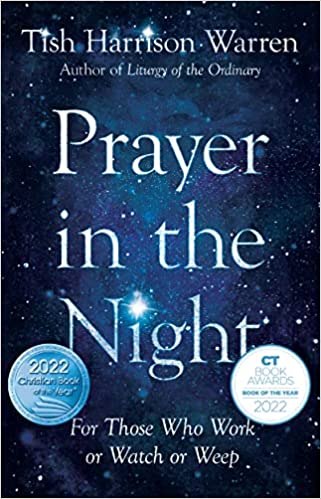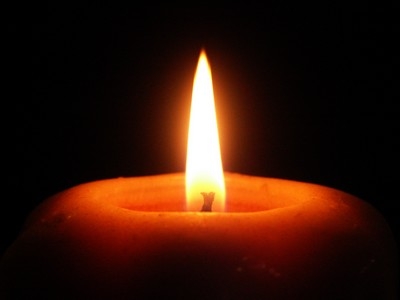In her book Prayer in the Night: For Those Who Work or Watch or Weep, Rev. Tish Harrison Warren takes us through her personal journey of a dark night of the soul when she experienced her own vulnerability, suffering, and God’s seeming absence. Within this darkness, she found strength and comfort within the final prayer of Compline: Keep watch, dear Lord, with those who work, or watch, or weep this night, and give your angels charge over those who sleep. Tend the sick, Lord Christ; give rest to the weary, bless the dying, soothe the suffering, pity the afflicted, shield the joyous; and all for your love’s sake. Amen. In her book, she takes us through this prayer as a way to speak to God into the darkness and as a way to see the world around us more clearly and to appreciate the beauty that remains even within the brokenness of our lives. This Epiphany/Lenten study covers twelve weeks.
(Epiphany/Lent 2023)
Prayer in the Night – Rev. Tish Harrison Warren
In her book, Rev. Warren seeks to guide us into a very heart-centered experiential contemplation of our relationship with God, even when it seems that God may be absent.
As I prayed that night, I wanted to believe the things I proclaimed: that God knew and loved me, that this terrible moment, too, would be redeemed. I believed it and I didn’t. Reaching for this old prayer service was an act of hope.
When we pray the prayers we’ve been given by the church – the prayers of the psalmist and the saints, the Lord’s Prayer, the Daily Office – we pray beyond what we can know, believe, or drum up ourselves.
The question, therefore, that we must face is “How do we trust a God who does not stop [bad things] from happening? How do we dare ask him to keep watch?”
She ends this chapter with the promise that God does make: “he will keep us close, even in darkness, in doubt, in fear and in vulnerability. He promises that we will not be left alone. He will keep watch with us in the night.”
It is in the quiet and in the solitude of the night that our unresolved sadness begins to spill out. We ask God to watch over those who persist in unresolved grief because we know that each of us will suffer from this persistent grief.
We ask God to keep watch with those who weep because we know the end. John gives us this vision of a transformed creation where the church is that beautiful, life-giving, at-one-ness with God. “Weeping may tarry for the night / but joy comes with the morning.” Ps. 30:5b.
During our discussions tonight on the absence of weekly liturgical prayer specifically for those who are mourning, we discussed the Mourner’s Kaddish which is said each week during a traditional Jewish prayer service. The prayer is as follows:
Watching is a craft to develop. To watch is to wait, patiently. Watching implies attention, yearning, and hope. If the fear in the night tells us that grace will not be enough, then in watching we must be attentive to the grace that is there.
When we watch, we need to open our mind’s eye to the divine reality that is within us and that surrounds us. We need to see the realm of the intangible, qualitative world of meaning, value, and higher purpose.
“Our work – whether paid or not, drudgery or not, skilled or common – makes a difference. Done well, it adds truth, beauty, and goodness to the world.” Again, our work is part of God’s work.
When we pray for healing or redemption or peace or justice, we are praying for those who work – for scientists, doctors, poets, potters, researchers, retail clerks, farmers, politicians, and pilots – these actual and limited men and women through who God is bringing renewal.
Everlasting God, you have ordained and constituted in a wonderful order the ministries of angels and mortals: Mercifully grant that, as your holy angels always serve and worship you in heaven, so by your appointment they may help and defend us here on earth; through Jesus Christ our Lord, who lives…
Rev. Warren invites us to see how the daily act of going to sleep is a spiritual practice of dying in Christ. The benefits of sleep come about when we surrender our own will, and the same is achieved in Jesus.
We do not simply have bodies, we are bodies. Pain, pleasure, trauma, and anguish are embodied states.
The Prayer does not ask that the sick be healed, but that they be tended. It does not request a physician but a shepherd. What we are asking, is that God will guide us into the blessings that sickness can provide.
The promise that Jesus makes to us is that in our weariness, he will give us rest, and we will find our rest within him.
In silence, we come to rest in the ineffable presence of God and come to be patient with God’s own silence. It is in our silence, at the point of exhaustion, that our questions simply melt away, and true rest is found.
Our faith is in a God who has come to rescue His creation from the absurdity of sin and the emptiness of death and so we are permitted to hate these things with a perfect hatred.
These depths of human vulnerability birth a particular kind of blessedness. What does it mean to find blessing in the darkest moments of our lives?
As followers of Jesus, the promise is that will not escape suffering, but the promise is also that at the depth of our suffering, God will be there and the Holy Spirit will comfort and guide us.
In soothing our suffering, Jesus does not make us stronger. He may not even take away the cause of the suffering itself. But the promise he gives us is that in facing our suffering he will make it known that his grace is sufficient for us. 2 Cor. 12:9.
Inth ePrayer, we ask that God might feel what we feel, to enter into the dark room in which we find ourselves and sit with us in our pain and vulnerability.
Our hope is not only that Christ will be found among the afflicted, but that affliction itself will end. We long for a day when everything that is broken – in our bodies, in nature, in relationships, in society, in politics, in policing, in global economics – will be mended and…
Joy is not a matter of unrealistic optimism or an intentional looking away from the trials of our lives. Rather, cultivating joy is to see that deeper reality of living in the very presence of God.
Darkness is not explained, but it is defeated. Night is not a riddle to be solved, but a mystery to be endured until it too is overcome by the light. In those dark times, we must always remember the end. It might be Good Friday, but Easter is coming.


